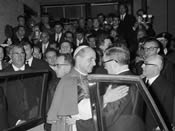The Eucharist (Greek, eu- , “good”, and charis, “favor”), the Sacrament of the Body and Blood of Christ—the Lord’s Supper, Holy Sacrifice, Holy Mass, Holy Communion—is, in the words of St. Josemaria, “the center and root of a Christian’s spiritual life” (Christ is Passing By, No. 87). Prefigured by Melchizedek’s offering of bread and wine (Gen 14:18), the Passover Meal (Ex 12, 13), and the manna in the desert (Ex 16), the Eucharist anticipates the Marriage Feast of the Lamb (Rev 19:9). The Church teaches: "At the Last Supper, on the night he was betrayed, our Savior instituted the Eucharistic sacrifice of his Body and Blood. This he did in order to perpetuate the sacrifice of the cross throughout the ages until he should come again, and so to entrust to his beloved Spouse, the Church, a memorial of his death and resurrection’" (CCC, No. 1333; quoting Sacrosanctum Concilium, No. 47). “The Eucharist is ‘the source and summit of the Christian life’” (CCC, No. 1334; quoting Lumen Gentium, No. 11).
At the Last Supper (Holy Thursday), our Lord brought the apostles to that one single sacrifice on
He who turned water into wine (Jn 2:1-11) and who multiplied five loaves of bread to feed five thousand men (Jn 6:1-14) could certainly change bread and wine into His Body and Blood. It is precisely the scene of the multiplication of the loaves that opens Chapter Six of the Gospel of St. John, as a prelude to our Lord’s Bread of Life Discourse.
“Jesus said to them, ‘I am the bread of life’ (v. 35)… ‘I am the living bread that came down from heaven; whoever eats this bread will live forever; and the bread that I will give is my flesh for the life of the world.’ The Jews quarreled among themselves, saying, ‘How can this man give us (his) flesh to eat?’ Jesus said to them, ‘Amen, amen, I say to you, unless you eat the flesh of the Son of Man and drink his blood, you do not have life within you…For my flesh is true food, and my blood is true drink. Whoever eats my flesh and drinks my blood remains in me and I in him…Then many of his disciples who were listening said, ‘This saying is hard; who can accept it?’...As a result of this, many (of) his disciples returned to their former way of life and no longer accompanied him” (vv. 48-66).
Our Lord meant this teaching to be taken literally, which his audience also understood literally, which is why many of them left, and why our Lord did not hold them. Instead, “Jesus then said to the Twelve, ‘Do you also want to leave?’ Simon Peter answered him, ‘Master, to whom shall we go? You have the words of eternal life. We have come to believe and are convinced that you are the Holy One of God’" (vv. 67-69).
"Because Christ our Redeemer said that it was truly his body that he was offering under the species of bread, it has always been the conviction of the Church of God…that by the consecration of the bread and wine there takes place a change of the whole substance of the bread into the substance of the body of Christ our Lord and of the whole substance of the wine into the substance of his blood. This change the holy Catholic Church has fittingly and properly called transubstantiation. The Eucharistic presence of Christ begins at the moment of the consecration and endures as long as the Eucharistic species subsist. Christ is present whole and entire in each of the species and whole and entire in each of their parts…The Catholic Church has always offered and still offers to the sacrament of the Eucharist the cult of adoration, not only during Mass, but also outside of it, reserving the consecrated hosts with utmost care, exposing them to the solemn veneration of the faithful” (CCC, Nos. 1376-1378).
St. Josemaria writes: “Think of the human experience of two people who love each other, and yet are forced to part. They would like to stay together forever, but duty — in one form or another — forces them to separate. They are unable to fulfil their desire of remaining close to each other, so man's love — which, great as it may be, is limited — seeks a symbolic gesture. People who make their farewells exchange gifts or perhaps a photograph…They can do no more, because a creature's power is not so great as its desire.
“What we cannot do, our Lord is able to do. Jesus Christ, perfect God and perfect man, leaves us, not a symbol, but a reality. He himself stays with us. He will go to the Father, but he will also remain among men. He will leave us, not simply a gift that will make us remember him, not an image that becomes blurred with time, like a photograph that soon fades and yellows, and has no meaning except for those who were contemporaries. Under the appearances of bread and wine, he is really present, with his body and blood, with his soul and divinity.” (Christ is Passing By, No. 83)
O.C.P.A.J.PM.









No comments:
Post a Comment